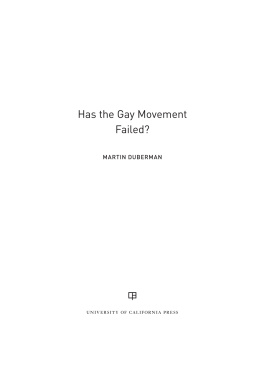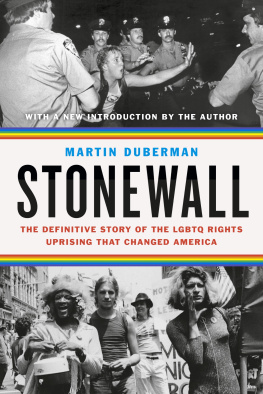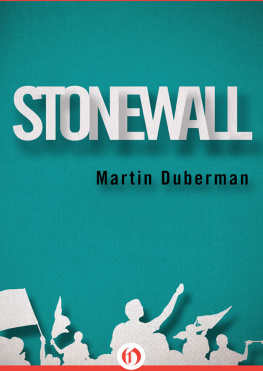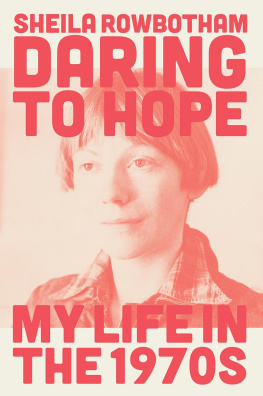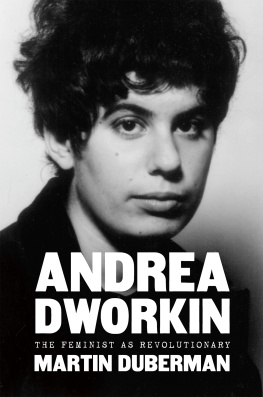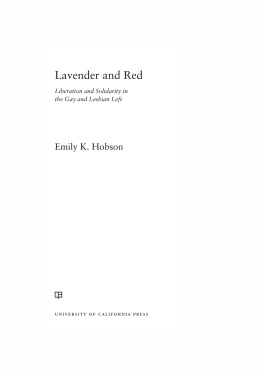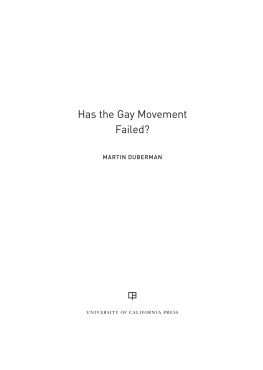Duberman - Has the Gay Movement Failed?
Here you can read online Duberman - Has the Gay Movement Failed? full text of the book (entire story) in english for free. Download pdf and epub, get meaning, cover and reviews about this ebook. City: United States, year: 2018, publisher: University of California Press, genre: Politics. Description of the work, (preface) as well as reviews are available. Best literature library LitArk.com created for fans of good reading and offers a wide selection of genres:
Romance novel
Science fiction
Adventure
Detective
Science
History
Home and family
Prose
Art
Politics
Computer
Non-fiction
Religion
Business
Children
Humor
Choose a favorite category and find really read worthwhile books. Enjoy immersion in the world of imagination, feel the emotions of the characters or learn something new for yourself, make an fascinating discovery.
Has the Gay Movement Failed?: summary, description and annotation
We offer to read an annotation, description, summary or preface (depends on what the author of the book "Has the Gay Movement Failed?" wrote himself). If you haven't found the necessary information about the book — write in the comments, we will try to find it.
Has the Gay Movement Failed? — read online for free the complete book (whole text) full work
Below is the text of the book, divided by pages. System saving the place of the last page read, allows you to conveniently read the book "Has the Gay Movement Failed?" online for free, without having to search again every time where you left off. Put a bookmark, and you can go to the page where you finished reading at any time.
Font size:
Interval:
Bookmark:

MARTIN DUBERMAN

UNIVERSITY OF CALIFORNIA PRESS
University of California Press, one of the most distinguished university presses in the United States, enriches lives around the world by advancing scholarship in the humanities, social sciences, and natural sciences. Its activities are supported by the UC Press Foundation and by philanthropic contributions from individuals and institutions. For more information, visit www.ucpress.edu.
University of California Press
Oakland, California
2018 by Martin Duberman
Library of Congress Cataloging-in-Publication Data
Names: Duberman, Martin B., author.
Title: Has the gay movement failed? / Martin Duberman.
Description: Oakland, California : University of California Press, [2018] | Includes bibliographical references and index. |
Identifiers: LCCN 2017056078 (print) | LCCN 2017060440 (ebook) | ISBN 978-0-520-97084-7 (epub) | ISBN 978-0-520-29886-6 (cloth : alk. paper)
Subjects: LCSH : Gay liberation movementUnited StatesHistory. | Gay rightsUnited StatesHistory. | Gay Liberation Front (New York, N.Y.)
Classification: LCC HQ 76.8. U 5 (ebook) | LCC HQ 76.8. U 5 D 835 2018 (print) | DDC 306.76/60973dc23
LC record available at https://lccn.loc.gov/2017056078
Manufactured in the United States of America
26 25 24 23 22 21 20 19 18
10 9 8 7 6 5 4 3 2 1
For Eli
O let none say I Love until aware
What huge resources it will take to nurse
One ruining speck, one tiny hair
That casts a shadow through the universe.
W.H. Auden, In Sickness and in Health
True democracy begins
With free confession of our sins.
In this alone are all the same,
All are so weak that none dare claim
I have the right to govern, or
Behold in me the Moral Law,
And all real unity commences
In consciousness of differences.
W.H. Auden, New Year Letter
I.
II.
III.
IV.
My great thanks to Michael Bronski, Marcia Gallo, John Howard, and my partner, Eli Zal, all of whom have read the manuscript in its entirety; their wise suggestions were invaluable.
At the University of California Press Ive been blessed with a dream team of talented specialists, and I very much appreciate their contributions: Kate Hoffman (project editor), Bradley Depew (editorial assistant), Peter Perez (public relations), Lia Tjandra (cover designer), and Jolene Torr (marketing manager). Im profoundly indebted as well to Steven Baker for copyediting the manuscript with immense skill (including the upgrading of my primitive digital skills), and to Mark Mastromarino, who blessed me with a superb index. Above all I owe an enormous debt to my editor Niels Hooper for bringing me into the fold and for his sensitive, trenchant guidance throughout the entire process.
VICTORY, the book cover shoutsand its tagline raises still higher the triumphalist beat: How a Despised Minority Pushed Back, Beat Death, Found Love, and Changed America for Everyone.
Have we wandered into a revival meeting? No, Victory is one of several recent books, a whole new genre really, that portrays the improved public perception of LGBTQ people in hyperbolic terms skirting dangerously close to parody. Among other recent narrative histories that fall into the triumphalist campthough less given than Victory to exaggerated tall talesare Michael Klarmans From the Closet to the Altar, Jim Downss Stand By Me, George Chaunceys Why Marriage? , Debbie Cenzipers Love Wins, and Nathaniel Franks Awakening.
It is not wrong to claim that the past fifty years have marked a notable, even remarkable change in attitude toward sexual minorities in the United States. In the past half century weve gone from being all but uniformly pathologized and condemnedyes, even hunted to being widely accepted as a legitimate minority (something like an ethnic one, though nobody
Im not alone in feeling limited satisfaction with what most gay people are hailing as the speediest success story in all of our countrys long history of social protest. The grumblers among us are a decided minority. Were overrepresented among gay academics and public intellectuals, but scarcely represented at all in the LBGTQ population at large. When complaining among ourselves, someone invariably cites the contrast between the movements recent assimilationist agendamarriage rights and permission to serve openly in the armed forceswith the far broader agenda that had characterized the Gay Liberation Front at its inception following the 1969 Stonewall riots. GLF had called for a fierce, full-scale assault on sexual and gender norms, on imperialistic wars and capitalistic greed, and on the shameful mistreatment of racial and ethnic minorities.
Or had it? Were we mythologizing the early years of the movement, exaggerating its scope in order to substantiate our discontent with what we viewed as the shriveled posture of the movement in its present guise?
In search of an answer, I took down a book from my shelves that I hadnt looked at in a very long time: Out of the Closets: Voices of Gay Liberation, the pioneering anthology that Karla Jay and
Many months of reading followedalong with a complex set of reactions, and somewhat more confusion than Id anticipated. Yes, GLF had expressed empathy for nonconformists of varying stripes, had usually been clearheaded about our countrys predations abroad and its indifference to misery at home (though GLFs rhetoric was sometimes more clamorous than its practice). And, yes, it had taken a generous swipe at traditional gender roles, the nuclear family structure, and lifetime, pair-bonded monogamy. Yet it had often done so at the top of its lungs, in utopian language of sometimes lofty (and stupefying) abstraction, and with more than a little self-righteousness. And like most left-wing movements for social change, GLFs internal debates had often been strident, with members frequently and passionately denouncing one another, often along gender lines.
Qualifiers aside, I came away from my self-imposed refresher course reaffirmed in my view that the modern gay movement in the period immediately following the 1969 Stonewall riots had indeed been broadly radical. It presented a substantive challenge to national values and institutions and was strenuously at odds with a merely liberal politics that simply called for integrating increasing numbers of people into what was purportedly a beneficent system. None of which came as much of a surprise, since I knew that many of those who joined GLF had earlier been energetically involved in the militant student, civil rights, feminist, and antiwar movements. A significant number of GLF recruitspeople like Martha Shelley, Jim Fouratt, Ellen Shumsky (a.k.a. Ellen Bedoz), Michaela Griffo, Michael Brown, Karla and Allenhad previously marched on behalf of black rights, participated in early feminist protests, and joined actions against the war in Vietnam. The Stonewall riots had refocused their energies on gay liberation, yet in shifting priorities theyd maintained their prior concerns with racism, sexism, and imperialism.
The gay leftlike every other kind of left in this countryhas rarely represented more than a small minority. GLF and its less radical successor the Gay Activists Alliance (GAA) together probably numbered no more than a few hundred peoplethough more, doubtless, attended their dances. The straight left has periodically enlisted many more, with membership mushrooming during periods of uncommon economic hardshiplike the Great Depression of the 1930s and the labor wars of the late nineteenth centuryor in response to immoral foreign interventions (like the war in Vietnam). Yet once conditions improved, left-wing protest in this country has disintegrated with notable rapidity; it has historically failed to develop the sustaining power characteristic of the left in Europe.
Font size:
Interval:
Bookmark:
Similar books «Has the Gay Movement Failed?»
Look at similar books to Has the Gay Movement Failed?. We have selected literature similar in name and meaning in the hope of providing readers with more options to find new, interesting, not yet read works.
Discussion, reviews of the book Has the Gay Movement Failed? and just readers' own opinions. Leave your comments, write what you think about the work, its meaning or the main characters. Specify what exactly you liked and what you didn't like, and why you think so.

